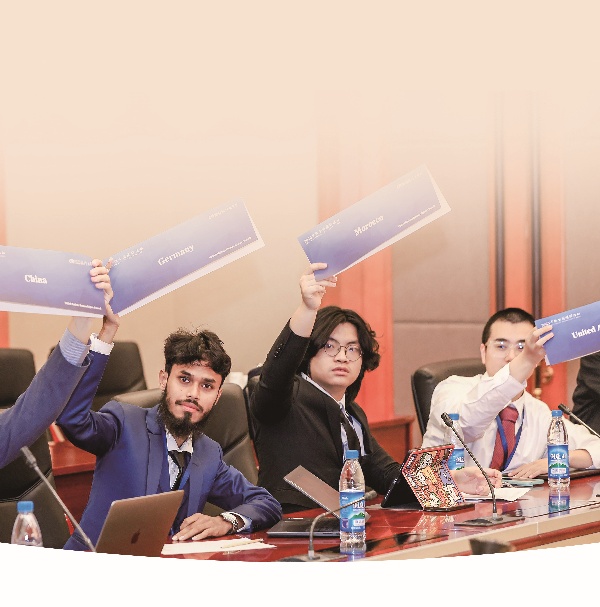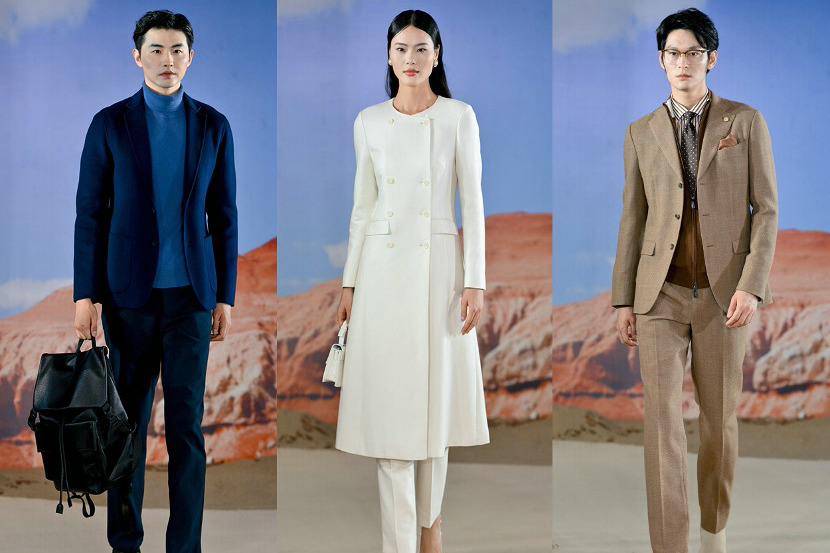Future leaders tackle global challenges
Young delegates from around the world gather in Suzhou to collaborate on solutions for conflict, climate, and equitable global development.


In a meeting room at Taihu International Convention Center on Aug 3, young delegates gathered in Suzhou, Jiangsu province, to simulate a United Nations Human Rights Council session.
They came from China, Bangladesh, Slovenia, and Germany, engaging in heated discussions on "Strengthening the Protection of Civilians in Sudan".
The scene was part of the 2025 China Daily Model United Nations (CDMUN), organized by China Daily's 21st Century English Education Media.
Held from Aug 3 to 6, the four-day event attracted more than 1,000 participants. It included a keynote speech and a "Global Village" cultural exchange. Delegates from universities, high schools and middle schools formed 13 Chinese- and English-speaking committees to explore a range of topics under three main themes.
This year marks the 80th anniversary of the founding of the UN. In tribute to this milestone, discussions covered core issues such as protecting climate-vulnerable groups and coordinating AI governance.
The second theme, in honor of the 80th anniversary of the victory in the World Anti-Fascist War, addressed topics including civilian protection in armed conflicts and strategies to counter evolving terrorist tactics.
The third, centered on the Global South, examined agendas such as reshaping equitable pathways for development finance and promoting fair ecological justice responsibilities.
Xue Yuxue, former senior official of the UN Development Programme, delivered a speech titled "From CDMUN to the World". "I'm pleased to see CDMUN growing increasingly international, with global youth gathering in Suzhou to deliberate on world affairs," he said.
He described the participants as a generation that has never known a world without the UN and emphasized their role in shaping the future.
"Engaging in Model UN is far more than an academic exercise," he told delegates. "You are not just here to simulate international diplomacy — you are stepping into a tradition that mirrors the very spirit of the UN."
Shaping futures
Among the attendees was a delegation of 11 students from Slovenia. After spending a few days in Shanghai before arriving in Suzhou, chief delegate Val Marusic said they were impressed by "the scale and energy of the cities" and "the hospitality and depth of culture".
He also drew inspiration from the event's slogan, "Avoid the distractions of unsubstantial ideas and superficial fame". "Real diplomacy isn't about the most dramatic speech or the flashiest proposal, but about consistency, patience, and working through difficult disagreements with honesty and respect," he said.
For 24-year-old Md Yeasin Arafta from Bangladesh, the event was both fresh and inspiring. As a first-time MUN delegate, he spent a week preparing through research papers and videos on humanitarian crises, focusing on civilian protection in Sudan.
Representing a new generation of Global South voices, Arafta called for more international attention to regional challenges, citing population pressures and unequal resource distribution in Asia. "Good debates can help solve our problems. I hope Asian issues receive more discussion," he said.
Arafta aspires to become an "international youth", defined as someone who is "knowledgeable, proactive, empathetic, and courageous". "A young person with a global vision should be aware of current situations," he said. "There are numerous issues awaiting resolution — food, shelter, and humanitarian support. This is why we should engage in more activities like this."
Leopold Martin Chen Lind, a German student at Tsinghua University, shared similar views.
He believes an international youth is driven by "an endless thirst for understanding the world around them" and "an openness and willingness to engage in dialogue with youth from other countries" combined with "overwhelming empathy for people and the planet".
He noted that delegates often represent countries other than their own, requiring them to collaborate on solutions that benefit others.
"It's a reminder that there are dimensions beyond international relations and diplomatic conflicts," he said.
Lind encourages an issue-based approach to balancing national identity and global perspectives. "Much of national identity is tied to domestic issues, but crises like climate change have global repercussions," he said.
Introduced to MUN at 15 while in high school in Germany, he has since attended numerous conferences — offline and online, at home and abroad — earning multiple awards and deepening his grasp of global affairs.
Yu Hongjun, former vice minister of the International Department of the CPC Central Committee, emphasized that young people must understand both the pressing issues facing humanity and their own nation's core concerns to participate effectively in global governance.
He said the highly international environment of CDMUN provides invaluable training opportunities.
"It allows them to stay informed about current global developments, align themselves with the progressive tides of history, and remain attuned to the broader historical journey of China embracing the world and the world embracing China," he said.




































